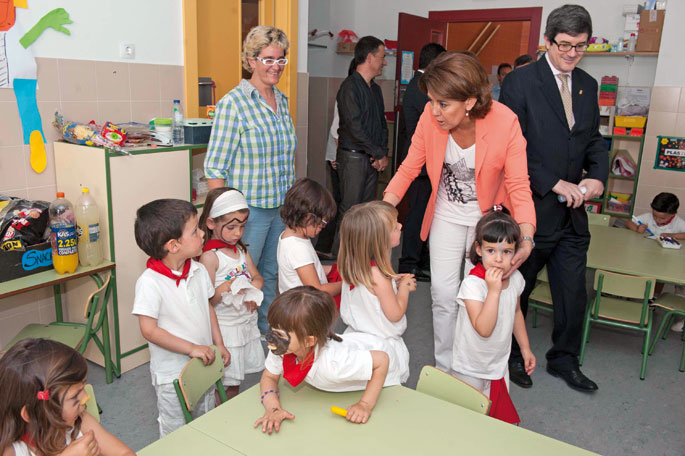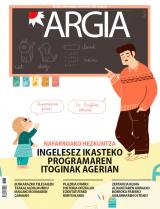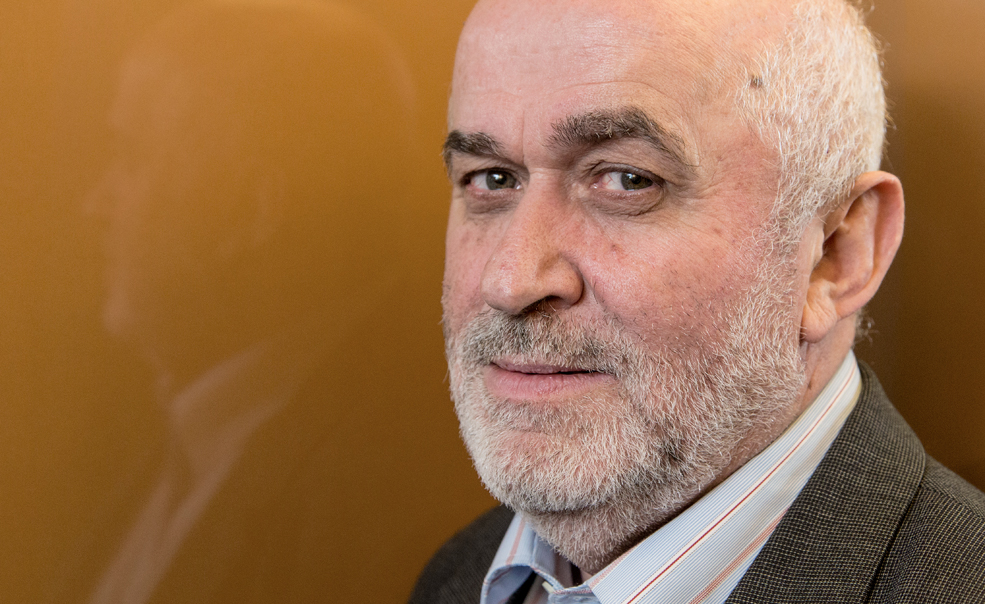The Most Round Goal by UPN
- The hook has been sweet, “your child will learn English perfectly.” However, the English Learning Program (PDI) has been criticized on the right and left by numerous educational actors, such as teachers, managers, parents and unions. The new government has to decide how the train leaving the rails is going just before UPN, with the support of the PSN, leaves. For the time being, it has ordered the moratorium and the evaluation of the results of the tests.

The UPN Government started testing the British model in 1997-1998. The TIL (Integrated Language Treatment) and the PDI (English Learning Programme). They wanted to prepare students for a globalised world, so that young people could acquire an excellent level of English in order to be able to work in the labour market. They didn't say they had found a good way to slow down the expanding Model D. In the Spanish state, right-wing forces use a similar strategy to weaken the languages of the Valencian Community, the Balearic Islands and Galicia.
The PDI implemented is located in 106 centers of the public network of Navarra, five of them are centers D and the other centers A and G. In the educational system, language, English has become an objective, and along the way the interesting lines of work developed for years, such as co-education, co-existence and reading, have remained on the txoko.
From British to the PDI, the implementation of the programme has had evident pedagogical deficiencies and gaps, which we will explain below. However, the Steilas union has considered that, although the methodology had been excellent, it is questionable whether the educational system assumes the foreign language as its main objective and allocates the resources to it.
The hot potato was launched by the UPN Government and is now held by a government made up of Geroa Bai, EH Bildu, Podemos and Left-Ezkerra. It has presented the design of an evaluation never before carried out, in which surveys, interviews and discussion groups will be conducted with directors, teachers and parents of educational centers, and in which universities and external companies will participate. In the meantime, the Government ' s programme agreement states: “The IDP will no longer be disseminated for at least one year to evaluate the current programme and to design a new integrated language treatment plan.” Therefore, the programme will not be extended to centres that do not have it, but those that have it will continue and those of 3 years will also be able to start in September 2016.
According to the information received by the Government of Navarra, the English Learning Programme in its implementation has failed to comply with the protocols and standards required in this case. The valuation of technicians from the Department of English and Other Foreign Languages is similar: in the last two courses, only one in ten centers where the PDI has been implemented has a positive evaluation of its implementation. It was recommended that it should not be established in three quarters of the centres.
How do you explain photosynthesis if you don't know it in English?
Before answering this question, let us tell what are the main characteristics of the PDI program. In Early Childhood Education (3-6 years) and Primary (6-12 years) it is being implemented. According to the center and age, between 30 and 40% of the subjects are taught in English. Therefore, it is not that English is a subject, but that subjects such as mathematics, environment, plastic are taught. The children have two tutors, one teaches the subjects in English and the other in Spanish. Only five centers are in Basque and English, that is, in the D-IIP model.
According to Steilas “the program has no pedagogical basis”. And when he says that, he refers, among other things, to teacher training. The primary objective of the Department of Education is for teachers to reach level C1, which is English learning, and to that end investments have been made. However, it is very different to prepare teachers to teach subjects in English. In this sense, coordination between the two tutors is essential to control how the subjects are taught in each language. However, “mentors don’t have time for coordination, take advantage of breaks, talk in the hallways, talk about WhatsApp and e-mail.”
The PDI program is a semi-immersion model. Children from Elementary and Children do not master English and when explaining the contents, they often have to lower the level of explanation or use visual resources. The child would use his/her own words to explain photosynthesis in the language he/she dominates. On the other hand, it does not develop in English and learns from memory phrases, among other things. In mathematics, plastic or physical education, there's not that much loss, but in subjects where language has a lot to say, yes, in natural and social sciences.
Angry, disappointed and tired by the faculty
The Steilas trade union approached a number of professors to make a report on the PDI. To learn more about their work and their conditions, we have indicated that ARGIA would interview a professor. The answer has been clear: “Maybe someone says yes, but I don’t think they want it to appear.” The teaching staff is disappointed for many reasons: for not having adequate training, for not having time to coordinate with the other tutor in the school, for dancing from one center to another, for forcing them to work in the PDI…
The Department of Education has launched the PDI programme and has spread throughout Navarre, but there are not enough adequately trained teachers. There are not enough teachers with a C1 level in English and a Primary or Early Childhood Education degree. Therefore, they have used more than one trick so that they can have teachers who teach PDI. In fact, professors are asked to level C1, but because there are not enough professors to meet the demand, those with level B2 have also been put to work. Now, level C1 has been provisionally accredited to faculty until 2021. Steilas said: “More than 80% of teachers say they have C1, that is, half have the provisional certificate.” There are professors with level C1 but who do not have the title of Early Childhood and Primary Education. They have been given more rapid means of obtaining their titles.
The teaching staff of the PDI do not have the most appropriate conditions to work. What's curious is that there are teachers who have level C1, but they are trying to hide it, because they don't want to participate in this program, because they know that they have little time to prepare classes, that they have very little training and that each has to give a lot of themselves. Others with C1 felt that they did not have a sufficient level to teach the English lessons to the students.
Are students able to keep pace?
Some yes and others no. An example given by Steilas: “In Zambia, as soon as they start school, they do everything in English. The fastest ones take everything, and those who don’t take it stay on the road.” In the IIP program, English doesn't take as many hours as it does in Zambia, but problems arise. Children with learning difficulties before the PDI stayed in the classroom and went out from time to time to receive special classes. Now, all hours taught in English are out of class. Other boys and girls have had to stay unattended, as next year’s boys and girls have started on the IIP programme. Allophone students also have work. They do not bring either the Basque or the Spanish from home, they are children of Senegalese, Romanian and Maghreb, among others. One language at home and two new in school (English-Spanish or English-Euskera).
The teachers themselves say that small delays in the learning process have become permanent special needs.
Nowhere else in Europe
In Europe, the only territory operating as Navarre is Cantabria of the Spanish State. There they also begin to teach English courses in Early Childhood Education. In the Spanish state (also in the CAV) the most common thing is that at 3 years of age start learning English as a subject. In Europe, in general, they start later.
Experts have serious doubts about the benefits of starting to learn the foreign language at such an early age. 2014 (ARGIA No. 2.424) We ask three experts for their opinion on the English teaching method in CAV education. These are not linguistic models comparable to that of the CAV and Navarre, but we believe that the words of the experts are valid. Jasone Cenoz (Professor of Education Sciences at UPV/EHU) hardly believes that starting to teach English at the age of 4 has advantages. If they do better in the pronunciation: “But not with the teachers here, and to get the pronunciation you need a massive linguistic input.” Uri Ruiz Bikandi (Professor of Teaching Language at the University School of Magisterium of Vitoria-Gasteiz at the UPV/EHU) considers it a useless expense to start as soon as with English, “and by putting English early you can lose the space you had for Euskera. In Navarre they have done it.” Asked by Itziar Elorza (professor at the University School of Magisterium of Donostia-San Sebastian at the UPV/EHU) if it is profitable for society to teach English between 4 and 8 years, she replied that it can be doubtful: “If later the same economic resources were put in place and done differently…”, and this is the linguistic management of the CAV, which has received a much higher valuation than that of Navarre.
Democratization?
Learning English is the luxury of private centers. UPN, some unions and groups of fathers and mothers say it was. On the other hand, they affirm that they have democratized the education model for families of high socioeconomic level thanks to the integration of the IIP program in public centers. Steilas believes that the opposite has happened, as the gaps between students from different socioeconomic levels have spread. The higher the family, the more resources to help the student, if he does not go to school he can help his parents (he has more chances of learning English), or in winter he will go to school and in summer to Ireland. A student with few resources will not have that opportunity and a serious risk of not learning English and not exceeding the rest of the subjects.
It is not a unique opportunity for all, and furthermore, in many villages, because there is only one centre, they have had no other option, the PDI yes or yes.
If you passed the test to this room or the other room
Let's take the example of Euskera. In the Castilian speaking environment, students have studied between 30 and 40% of the annual subjects in Basque. At 12 years old, he has performed the Basque exam and has not passed it. The child has been moved to the line that is entirely in Spanish. That's what they do in Navarra in Compulsory Secondary Education. Before you start ESO, you have to pass the sieve. Those who pass the English test will continue in the Spanish-English model and those who do not pass it in Spanish. After years of eating large doses of English, it's over. It is in this classroom that the home allophones are concentrated, those who have started late in school, those who have special difficulty learning...
Nafarroako Gobernuaren lehen eskaintza. 2015eko azaroaren hasieran Hezkuntza Sailak 425 lanpostuko Lan Eskaintza Publikoa (LEP) iragarri zuen, horietatik 334 2016rako (320 irakaslerako eta 14 behatzailerako). Beste 91 2017rako ziren, Bigarren Hezkuntzarako irakasle lanpostuak.
Euskarazko plazak arazo. 2016rako aurreikusitako 320 plaza horietatik, 228 ziren euskaraz eta 92 gaztelaniaz. Horrek sua piztu zuen Nafarroako gizartearen zati batean. AFAPNA, CCOO, UGT, UPN, PSN, PP, Izquierda-Ezkerra eta Ahal Dugu aurka agertu dira. EH Bildu, LAB, Steilas eta ELA alde.
Gaztelaniako irakasleak soberan. Euskarazko plazak gaztelaniakoak baino gehiago izateko argudio hau eman du Hezkuntza Sailak: Ingelesez Ikasteko Programak (IIP) sare publikoaren gaztelaniako zentroetan izan duen zabalkundearen ondorioz, gaztelaniako irakasle elebakarrak soberan dira eta, beraz, ez du zentzurik gaztelaniako plaza gehiago sortzea.
Madrilgo Gobernuaren helegitea. Otsailaren hasieran Estatuak helegitea jarri zuen UPNk 2015eko martxoan onartutako 358 plazako LEParen aurka. Hau ulertzeko 2015eko udal eta foru hauteskunde garaira itzuli behar da, orduan Javier Esparza UPNko lehendakari gaiak 900 lanpostuko LEPa iragarri baitzuen bere programan. Azkenean iazko martxoaren 25ean UPNren Gobernuak 358ko LEParen dekretua egin zuen, hauteskundeen atarian: 214 plaza osasunean, 134 hezkuntzan eta 10 suhiltzaileentzat.
2013, 2014 eta 2015erako Estatuak aurreikusitako irakasleen erretiroak ordezkatzeko postuak bilduta egin zuen hezkuntzako eskaintza José Iribas kontseilariak. Dekretuak ez zuen kontuan hartu 2014ko ordezkapen plazak LEP baterako erabilgarri uzteko, 2014aren amaiera baino lehenago egin behar zuela horretarako eskari formala. Estatuaren abokatuak orduan jakinarazi zion UPNri forma akats hori, baina UPNk aurrera egin zuen. Estatuak edozein unetan jar zezakeen helegitea, baina min gehien egin zezakeenean jarri du.
Kontua da UPNk ez zuela zehaztu hezkuntzako 134 plaza haietatik zeintzuk ziren 2014ari zegozkion ordezkapen plazak, amarru horrekin operazioa pasatuko zelakoan. Estatuaren abokatuak, beraz, denen aurkako helegitea jarri du.
Euskarazko 120 plaza bazterrean geratu dira. Helegitearen emaitzaren zain, eta presioen ondorioz, Haur eta Lehen Hezkuntzako 120 plaza korapilotsuak bazterrean gelditu dira (gehi behatzaileen 14ak), datozen hiru urteetan aterako direlakoan. Aurreikusitako 320 plazetatik, beraz, 200 bakarrik aterako dira orain, 108 euskaraz eta 92 gaztelaniaz. Erabaki honekin sailak Hezkuntzako Mahaiaren gehiengo sindikalaren –LAB, Steilas eta ELA (%56)– aurka egin du.
Zerrenda bakarrik ez. Euskarazko lerroetako irakasleen aldarrikapen historikoa da zerrenda bakarra, baina Nafarroako Gobernuak ez du onartu. Euskarazko irakaslea gai da klaseak euskaraz zein gaztelaniaz emateko, baina hautatu behar du euskarazko zerrendan edo gaztelaniakoan joatea. Gehiago jakitea zigortu egiten zaio. Aldarrikapena da irakasle guztiak zerrenda bakarrean joatea eta bakoitzak hautatzea non eman nahi dituen klaseak. Bi hizkuntza ofizial dituzten gainerako erkidegoetan hala da.
Orain arte azterketa egun eta ordu berean izan da eta aurten bi egunetan egingo da, horrela euskaldunak bietara joateko aukera izango du. Zerrenda bakarraren aurkakoek protesta egin dute, molde honetan euskaldunak bi aukera izango dituelako. Argudio horri helduta, AFAPNA sindikatuak helegitea jarri du LEPren aurka.
Bertsio luzea:
www.argia.eus/albistea/nafarroako-hezkuntzako-epearen-labirintoan-ez-galtzeko-gida
Ingelesez Ikasteko Programaren (IIP-PAI) “iruzurra agerian uzteko” eta “bertatik irteteko bideak aztertzeko” jardunaldiak antolatu dituzte Iruñean. Gaur egun, Nafarroako 100 ikastetxe baino gehiagotan oraindik derrigorrezkoa da programa polemiko... [+]
Ingelesez ikasteko programa ezarri duten lehen ikastetxetako ikasleekin ebaluatu dute programa bera. Ikastetxe horiek "ikasle aniztasun" txikia dutela nabarmendu du Roberto Perezek eta horrek ebaluazio-txostenean eragina izan duela dio.
Kanpo-azterketa berriak, aldaketak ikasgaietan, ingelesezko ordu gehiago, ebaluaketa irakasleei, mugimenduak goi-karguetan… Bero dator ikasturtea Hego Euskal Herrian, LOMCE, Heziberri, Ingelesez Ikasteko Programa edota D ereduaren zabalkuntza tarteko.


















